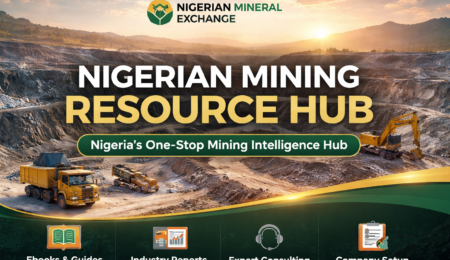The Awakening Giant: Nigeria’s Transformative Mineral Landscape
For far too long, the narrative of Nigeria’s economic might has been almost singularly tied to crude oil. Yet, beneath the very soil that holds vast petroleum reserves, lies an even more diverse and arguably more sustainable wealth: a Nigeria mining industry bursting with untapped potential. This sector, often overshadowed, is now awakening, poised to transform the nation’s economic landscape and redefine its global position.
Valued at an estimated $700 billion in untapped reserves, Nigeria’s solid minerals sector is no longer just a promise; it’s a rapidly developing frontier. Historically, mining was a significant contributor to Nigeria’s GDP, accounting for 4-5% in the 1960s and 70s before oil’s dominance led to its neglect. Today, after years of contributing a meager 0.17% to 0.3% of GDP, the sector is experiencing an aggressive resurgence, driven by visionary reforms and escalating global demand for critical minerals.
This comprehensive Nigeria mining industry overview will take you on a journey through its rich past, vibrant present, and promising future. We’ll unearth the diverse mineral wealth, dissect the catalytic government reforms, analyze the challenges, and illuminate the unparalleled investment opportunities that position Nigeria as Africa’s next economic giant.
A Geological Treasure Ocean: Nigeria’s Diverse Mineral Wealth
Nigeria is blessed with an extraordinary geological endowment, boasting over 53 solid mineral types in commercial quantities across its 36 states and the Federal Capital Territory. This diversity provides a robust foundation for economic diversification, moving away from single-commodity reliance.
Here’s a closer look at some of Nigeria’s most significant mineral assets:
- Precious Metals:
- Gold: Found extensively along the schist belts in states like Zamfara, Kaduna, Osun, Kebbi, Niger, and Kogi. Nigeria’s gold potential is immense, with ongoing efforts to formalize artisanal mining and establish a thriving gold value chain (e.g., the Kano Gold Souq Trading Centre initiative). Recent production figures indicate an increasing trend, albeit from a low base.
- Critical Minerals (Minerals of the Future):
- Lithium: Crucial for electric vehicle (EV) batteries and renewable energy storage. Significant reserves have been identified in commercial quantities in states such as Nasarawa, Kwara, and Oyo. Nigeria aims to move beyond raw lithium export to local processing, attracting substantial foreign investment in processing plants.
- Rare Earth Elements (REEs): Essential for high-tech applications, defense, and green technologies. While specific large-scale commercial exploitation is nascent, their confirmed presence positions Nigeria strategically in future global supply chains.
- Tin & Columbite/Tantalite: Historically significant, these minerals are used in electronics and high-temperature alloys. Large deposits exist in Plateau, Nassarawa, and other states, with considerable potential for revival and value addition.
- Industrial Minerals:
- Limestone: With over 10.6 billion tons of proven reserves, limestone is a cornerstone of Nigeria’s rapidly growing cement industry, crucial for infrastructure development. Major deposits are in Kogi, Ogun, Ebonyi, and Benue States.
- Bitumen: Nigeria holds the second-largest bitumen reserves in the world (estimated at 42 billion tons, almost twice its crude oil reserves), primarily in Ondo, Lagos, Edo, and Ogun States. This resource remains largely unexploited, presenting colossal opportunities for road construction and asphalt production.
- Iron Ore: Over 3 billion tons of iron ore resources are found in Kogi, Enugu, and Niger States. The Ajaokuta and Aladja Steel Complexes highlight the potential for a robust domestic steel industry, reducing import dependency.
- Coal: Nigeria boasts nearly 3 billion tons of indicated coal reserves across 17 identified fields, including Enugu, Kogi, Nasarawa and Benue, with over 600 million tonnes proven. Nigerian coal is known for its low sulfur and ash content, making it environmentally favorable, with export potential to Europe and Asia.
- Lead/Zinc: Estimated at 10 million tons across eight states, with significant proven reserves in the Southeast and Northcentral regions.
- Baryte & Bentonite: Critical for oil and gas drilling, with substantial reserves identified in Taraba, Bauchi (Baryte: 7.5 million tons), and many states (Bentonite: 700 million tons).
- Talc & Gypsum: Extensive deposits used in various industries, from cosmetics to construction.
- Precious & Semi-Precious Stones (Gemstones):
- Nigeria is globally renowned for its high-quality gemstones, including Tourmaline (Paraiba, bi-color, watermelon varieties), Sapphire, Aquamarine, Emerald, Garnet, Amethyst, Topaz, and Zircon. Major mining areas include Plateau, Kaduna, Nasarawa, Oyo, and Bauchi States. These gems offer significant value addition opportunities in cutting, polishing, and jewelry manufacturing.
This comprehensive mineral portfolio underscores Nigeria’s potential to become a global hub for diverse raw materials and processed mineral products.
The New Era: Visionary Reforms Catalyzing Growth
For decades, the Nigeria mining industry grappled with fragmented policies, limited investment, and a largely informal structure. However, under the current administration, spearheaded by the Ministry of Solid Minerals Development, a profound transformation is underway. The government’s strategic reforms are designed to unlock the sector’s full potential, attract significant investment, and ensure sustainable growth.
Key pillars of this new era include:
- Robust Legal and Regulatory Framework:
- Nigerian Minerals and Mining Act 2007: This foundational law vests ownership of all mineral resources in the Federal Government, regulating exploration, mining, and environmental protection. It provides for various mining titles (Reconnaissance Permit, Exploration Licence, Small Scale Mining Lease, Mining Lease, and Quarry Lease) and aims to streamline processes. While challenges in implementation persist (e.g., bureaucratic hurdles, state-federal conflicts), ongoing reviews aim to enhance its effectiveness and transparency.
- Mining Cadastre Office (MCO): Responsible for the transparent issuance and administration of mining titles, aiming to ensure security of tenure for investors. The eMC+ system has further digitized this process.
- Nigerian Extractive Industries Transparency Initiative (NEITI) Act 2007: Promotes transparency and accountability in revenue reporting and disclosures by extractive companies.
- Value Addition and Local Content Mandate:
- A central tenet of the current policy is to move beyond mere raw material export. The government mandates at least 30% local processing for all raw minerals before export, with a higher target of 35% for industrial minerals by 2030.
- This policy is already attracting significant investments, such as the $600 million lithium processing plant in Kaduna/Niger states (a joint venture with Chinese companies like Ming Xin Mineral Separation Nigeria Ltd., Jiuling Lithium Mining Company, and Canmax Technologies), aimed at producing high-grade lithium concentrate for the global battery market.
- Enhanced Geological Data and Exploration:
- The Nigerian Geological Survey Agency (NGSA) is at the forefront of providing reliable geoscience data. The recent launch of the Mineral Resources Decision Support System (MRDSS) in May 2024 is a game-changer, offering global investors transparent and accessible geological and policy information.
- Nigeria has committed a significant $630 million to expand exploration activities in 2025, a critical step to de-risk investments and provide accurate data on reserves.
- Private Sector-Led Digital Transformation:
- Complementing government efforts, the Nigeria mining industry is witnessing revolutionary strides led by the private sector. A prime example is the Nigerian Mineral Exchange (NME), an innovative tech platform developed by the African Trade and Commerce Development Company Ltd. (ATCDC). NME serves as Nigeria’s premier online marketplace for the entire mining industry ecosystem, digitally transforming how minerals are sourced, traded, and financed. By connecting miners, buyers, investors, equipment, and service providers on a transparent and efficient platform, NME is significantly accelerating transactions, broadening market access, enhancing trust through verified listings, and empowering stakeholders with real-time data and market analytics. This initiative is crucial in bridging critical market gaps and is preparing Nigeria for unparalleled global competitiveness in mineral trade.
- Strategic Financing and Partnerships:
- Solid Minerals Development Fund (SMDF): Provides financial support to mining projects, particularly for small and medium-scale miners, often in partnership with institutions like the African Finance Corporation (AFC).
- Africans for Africa Fund: A visionary initiative to mobilize continental capital for the development and industrialization of Africa’s mining and natural resource sectors.
- International Collaborations: Partnerships with countries like France bring technical assistance, advanced laboratory upgrades, and co-funding for exploration, accelerating modernization.
- Combating Illegal Mining and Formalizing Artisanal Operations:
- Recognizing illegal mining as a major drain on revenue and a source of environmental and security issues, the government has intensified crackdowns, including the creation and deployment of the Mining Marshals.
- Simultaneously, efforts are underway to formalize artisanal and small-scale mining (ASM) through cooperatives and training programs, integrating them into the formal economy, which boosts revenue, enhances safety, and improves environmental compliance.
These ambitious reforms, coupled with a renewed political will, are creating a more predictable, transparent, and attractive environment for investment in the Nigeria mining industry.
Economic Impact and the Path to Prosperity
While the mining sector’s current contribution to Nigeria’s GDP is relatively modest (around 0.3% in 2022 and 0.77% in 2023), its growth trajectory and immense untapped potential paint a different picture.
- Growth in Production: The sector has seen production grow by a Compound Annual Growth Rate (CAGR) of 28% from 54.5 million tons in 2019 to 89.48 million tons in 2021.
- Ambitious Targets: The government aims to increase mining’s GDP contribution significantly, with targets of 3% by 2025 (as per some roadmaps) and even an ambitious 10% in the longer term, underscoring its pivotal role in the nation’s economic diversification agenda.
- Job Creation: A formalized and mechanized mining sector has the potential to create millions of direct and indirect jobs across the value chain, from exploration to processing, logistics, and support services.
- Revenue Generation: Increased legitimate mining activities lead to higher tax revenues, royalties, and foreign exchange earnings, bolstering government coffers.
- Infrastructure Development: Investment in mining naturally spurs the development of critical infrastructure like roads, rail, and power, benefiting surrounding communities and other economic sectors.
The shift towards value addition means that more wealth will be retained within Nigeria, fostering industrialization and creating sustainable economic growth.
Navigating the Terrain: Key Challenges and Strategic Solutions
Despite the bright prospects, the Nigeria mining industry faces entrenched challenges that require persistent and strategic solutions:
- Illegal Mining and Smuggling:
- Challenge: Rampant illegal mining in states like Zamfara, Osun, Niger, and Kaduna, leading to significant revenue loss, environmental degradation (e.g., lead poisoning crisis in Zamfara), and exacerbating insecurity (funding armed groups).
- Solution: Intensified crackdowns by security agencies (Mining Marshals), formalization of artisanal miners through cooperatives, provision of financial support, modern equipment, and training to transition them into legal operations.
- Insecurity:
- Challenge: Banditry and other criminal activities in mineral-rich regions deter large-scale investment and endanger personnel.
- Solution: Enhanced security measures, inter-agency collaboration, and community engagement to foster trust and intelligence sharing.
- Infrastructure Deficit:
- Challenge: Poor road networks, unreliable power supply, and inadequate rail transport significantly increase operational costs for miners, especially in remote areas (e.g., Mambilla Plateau, Jos Plateau).
- Solution: Prioritizing infrastructure development in mining zones, investing in reliable electricity (on-grid and off-grid solutions), and expanding rail networks to link major hubs to ports.
- Limited Funding and Financing:
- Challenge: Difficulty for local miners and start-ups to access adequate capital for exploration, equipment, and processing.
- Solution: Strengthening the Solid Minerals Development Fund (SMDF), facilitating partnerships with financial institutions (e.g., AFC), promoting venture capital and crowdfunding, and leveraging the Africans for Africa Fund.
- Incomplete Geological Data and Outdated Technology:
- Challenge: Insufficient detailed geological mapping and reliance on rudimentary mining methods lead to inefficiency and missed opportunities.
- Solution: Increased government investment in comprehensive geological surveys (e.g., N1 trillion commitment), leveraging remote sensing and geospatial technologies, promoting the adoption of modern machinery, and fostering technology transfer through international collaborations.
- Regulatory Overlap and Bureaucracy:
- Challenge: Conflicts between federal and state governments over resource control, slow licensing processes, and sometimes aggressive enforcement by agencies like the EFCC create uncertainty for investors.
- Solution: Clearer delineation of roles between federal and state governments (constitutional review or inter-agency coordination), streamlining licensing procedures through digital platforms (eMC+), and ensuring consistent, investor-friendly regulatory enforcement.
- Environmental Concerns:
- Challenge: Thousands of abandoned mines, lead poisoning risks, land degradation, and water/air pollution from unregulated mining.
- Solution: Strict enforcement of Environmental Impact Assessments (EIAs), robust waste management and reclamation policies, promoting eco-friendly technologies, and holding operators accountable for environmental stewardship.
Addressing these challenges systematically will be paramount to fully unlocking the Nigeria mining industry’s vast potential and ensuring its sustainable development.
Investment Opportunities: Why Nigeria is the Next Frontier
The confluence of immense mineral wealth, a proactive government, and rising global demand for key commodities makes Nigeria an incredibly attractive investment destination in the mining sector.
Opportunities abound across the entire mining value chain:
- Exploration: With vast underexplored areas, significant returns await those who invest in detailed geological surveys and prospecting using modern technologies.
- Mining Operations: From large-scale mechanized mining of strategic minerals like iron ore, lithium, coal, and bitumen to formalized small-scale gold and gemstone mining.
- Processing and Beneficiation: The government’s value addition mandate creates massive demand for mineral processing plants (crushing, grinding, smelting, refining) for gold, lithium, tantalite, and industrial minerals. This is where significant profit margins lie.
- Mineral Trading and Export: Establishing transparent and efficient trading platforms, brokerage services, and export logistics for Nigerian minerals on the global market.
- Mining Equipment and Technology: Supply, rental, maintenance, and innovation of modern mining machinery, software, and automation solutions.
- Support Services: Providing specialized services such as geological consultancy, environmental management, safety training, legal and financial advisory, and logistics.
- Sustainable Mining Practices: Investment in renewable energy solutions for mining sites, waste recycling, and land reclamation projects.
Nigeria offers competitive fiscal incentives, a large domestic market, and strategic access to the West African regional market. The commitment to improving the ease of doing business and protecting investments provides a compelling reason to look at Nigeria now.
Future Outlook: Building a Sustainable and Prosperous Sector
The future of the Nigeria mining industry is bright, contingent on continued strategic execution. The vision is clear: to transform Nigeria from a raw material exporter into a key player in the global mineral value chain, driving industrialization and sustainable economic growth. Key future outlook include:
- Critical Mineral Hub: Nigeria is poised to become a significant supplier of lithium and other critical minerals for the global energy transition.
- Technological Adoption: Increasing integration of digital skills, automation, AI, IoT, and remote sensing will enhance efficiency, safety, and productivity.
- ESG Focus: Growing emphasis on environmental, social, and governance standards will attract responsible investment and ensure long-term sustainability.
- Local Content Development: Strengthening local participation, skills development, and indigenous capacity across the value chain.
The Nigeria mining industry is not merely a sector; it is a national project, a testament to diversification, and a beacon of economic potential for Africa.
Conclusion: The Giant Awakens – Your Call to Action
The transformation of the Nigeria mining industry is undeniable. From decades of dormancy, it is rapidly emerging as a dynamic, high-potential sector poised for explosive growth. The challenges, though significant, are being systematically addressed by a determined government and innovative private sector players like the Nigerian Mineral Exchange (NME), paving the way for unprecedented opportunities.
For those with foresight, vision, and the drive to innovate, this is a pivotal moment to engage with one of the world’s most promising mineral frontiers. Nigeria isn’t just a participant in the global mineral economy; it’s rapidly becoming a leader, offering a diverse portfolio of minerals and a welcoming environment for investment and entrepreneurship. Don’t just observe the rise of this giant; be a part of its monumental journey to prosperity.
Are you ready to translate Nigeria’s vast mineral potential into your next successful venture? 👉 Don’t just observe the rise of this giant – become a part of it! Download your copy of my exclusive ebook: “Unlocking Nigeria’s Mineral Wealth: 113 Lucrative Business Ideas” and get the practical blueprint to capitalize on these unprecedented opportunities!
READ ALSO:




